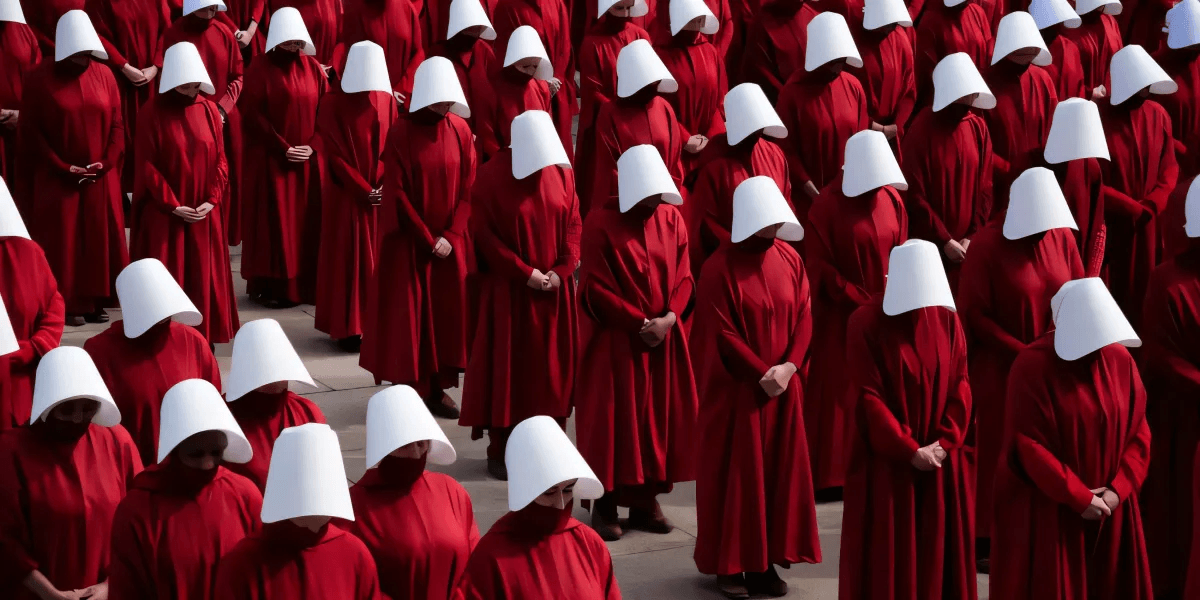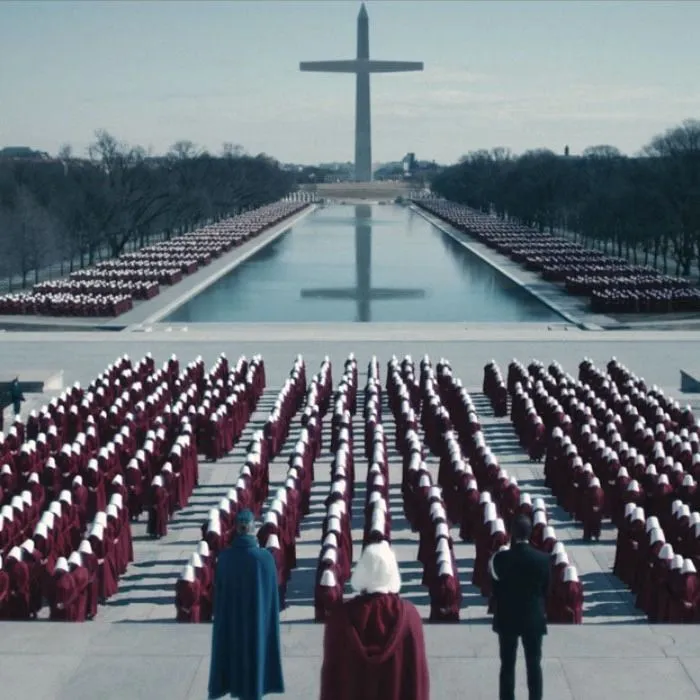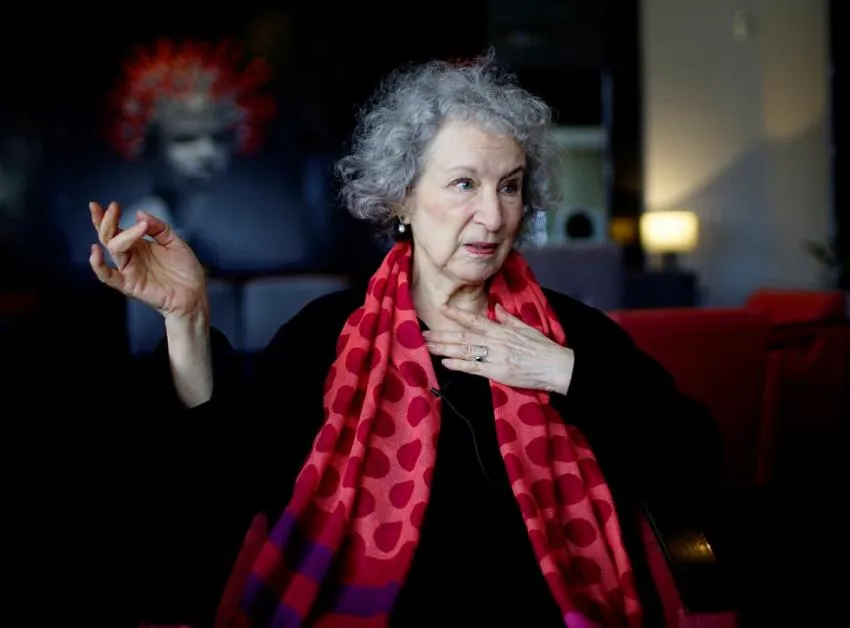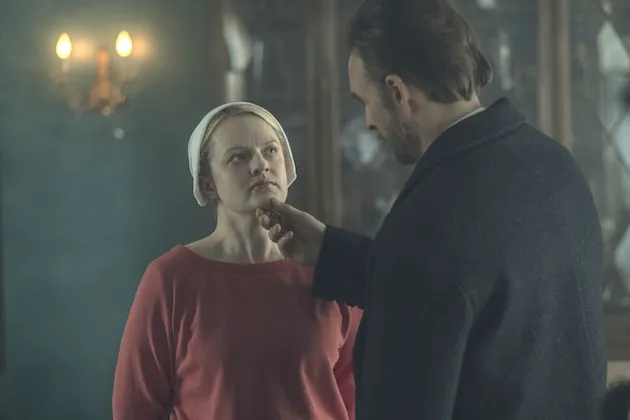Why 'The Handmaid’s Tale' Is A Must Read

It’s no secret that Margaret Atwood’s novel The Handmaid’s Tale is somewhat of a literary masterpiece; the 1985 novel is still widely spoken about and recognised today.
It is on many A-Level English specifications, as well as having a hit television show based on it. Further, a highly-anticipated sequel to the novel was released in 2019, entitled The Testaments. The handmaid’s costumes are somewhat iconic, universally recognised, and are often used in protests surrounding female rights and equality.
With all this in mind, the question must be asked, why all the hype? Why is this novel so powerful, and how is it still relevant today?
Well, here are some reasons why the handmaid's tale is a must-read.
1. The Representation of Women and Exploration of Feminism

Under The Republic of Gilead, the fictional dystopic world Atwood has created, women are redefined and forced into a life of subjugation to a patriarchal society. The reflections of women assigned by the government, such as the Handmaids, Econowives, and Aunts are representations of a woman’s previous sins.
An example of one of the sins portrayed is infidelity; the act of being unfaithful to a partner. In the text, women are completely stripped of their human rights and their voice is completely stifled. They are most notably oppressed of their reproductive rights; the ability to read and write is also removed.
The deprivation of rights suffered by women is extremely dehumanising, as they are unable to live their lives and record their history. This representation of women is shocking to readers, as it shows us what could happen to women, or anyone, under a strict government regime.
The feminist notes intertwined throughout the novel are extremely powerful pieces of writing and are responsible for many women’s feminist ideals.
2. Historical Relevance of the Novel

Another reason as to why this novel is a must-read is because everything within the novel has happened in the past, somewhere in history.
This is the single aspect of Atwood’s novel that I find probably the most intriguing. Whilst the novel is a work of dystopic fiction, none of the key elements are figments of Atwood’s imagination, it all happened in real life, at some point during history. Atwood herself once quoted:
“One of my rules was that I would not put any events into the book that had not already happened… nor any technology not already available. No imaginary gizmos, no imaginary laws, no imaginary atrocities. God is in the details, they say. So is the Devil.”
Here are some examples of historical events within the novel of how aspects related to the Holocaust, a key historical event:
One aspect of the novel which relates to the Holocaust is the mistreatment of women, which relates to the Nazi’s mistreatment of Jews during World War Two.
Just as Jews who were deemed unfit to work were sent to concentration camps and were killed, women who were deemed infertile in Gilead were sent to the Colonies, labelled as “un-women” and sentenced to certain death clearing radioactive, toxic waste.
Another example of relations between The Handmaid’s Tale and the Holocaust is the removal of identity. Within Atwood’s novel, handmaids lose their name, and they become the property of their Commander, the man she must have sex with and then fall pregnant with his child.
The protagonist of the novel, Offred, is called as such because she is the property ‘of’ her Commander, ‘Fred’; she literally is his property, as are all the handmaids to their respective Commanders.
They have no individuality, no names, and their bodies and faces are always kept hidden and concealed. Similarly, Jews in the Holocaust have stripped of their identities also, lost their clothes, and were tattooed with a number, and that was what they were known as.
3. Relevance to Contemporary Society
Furthermore, another reason as to why the novel is a must-read is because it is still relevant today. One example showing the relevance of Atwood’s novel in modern society is the rate of sales in key moments in recent history.
For example, when Donald Trump came into power in 2016, over 30 years after the novel was written, sales of The Handmaid’s Tale skyrocketed. Atwood’s publicist stated that “since the election, it's been 200 percent increase in sales.”
4. The Popularity of the TV Show

Further, there is also a TV show currently running on Hulu, this program has currently produced 4 seasons and a fifth is on the way, even though the plot directly following the book has now been completed.
The hit show accompanied by the sequel to the novel entitled The Testaments which was released in 2019 both serve to demonstrate how the novel is still relevant today.
The soon to be 5 seasons of the show exhibit how the concept is worthwhile pursuing, if it was not then the show would not still be running.
The fact that the show is streamed on multiple platforms (Hulu and Channel 4) further reinforces the popularity of the show, because multiple TV platforms are streaming the show meaning it is watched by people globally, not just in one country, as Channel 4 is a British platform and Hulu is American.
This is demonstrating that the show has generated global interest and made a global impact.
5. Atwood’s Admirable Fearlessness in Writing

There is no fear in exploring the difficult, stigmatized, or taboo political issues throughout the course of the novel.
Atwood is no stranger to tackling difficult issues and was not afraid to discuss them within The Handmaid’s Tale. So much so, it was “Banned and challenged for profanity and for ‘vulgarity and sexual overtones.’”
Personally, I admire Atwood for her bravery in exploring these issues, bringing attention and awareness to concepts such as infertility or totalitarianism, which do deserve to be spoken about.
6. The powerful novel inspired Political Protests
The influence of her exploration of these issues within the novel has gone on to symbolise very key political movements. For example, see Figure 1, of a protest against Trump, with whom the women compare Trump’s perception of women to be equal to Gilead’s perception of them.

7. The Novel is a Symbol of Overcoming Adversity
There are many iconic and famous quotes within the novel, one of which is a brilliant symbol representing overcoming adversity. It reads “nolite te bastardes carborundorum” which translates to “don’t let the bastards grind you down”. This is a great philosophy to apply to live, and one that massively resonates with me!
Especially as a teenager in school, I faced some adversity, and at the time I was really affected by people’s responses to who I was. But now, after having truly understood Atwood’s message in this one simple phrase, I realise that the adversity I faced was not my fault, so I should not let the ignorance or arrogance of others affect how I see myself.
When I look in the mirror, I no longer see a broken or damaged individual, I see someone who is empowered by the adversity she has faced, and that I will not “let the bastards grind [me] down”. In a novel that explores challenging and distressing themes, that are not upbeat or ending happily, Atwood still includes this affirmation, and I admire her for preaching resilience and bravery in this novel.
8. Offred is a Survivor and Someone we Can All Aspire to be Like in Some Form

This is not dissimilar to the point made above, but I love how Atwood not only uses a phrase (“nolite te bastardes carborundorum”) to symbolise resilience, she also uses a character: Offred.
I admire the character’s bravery throughout the novel, Offred endured so much through the course of the book, and it took me stepping back and looking at the novel as a whole to realise that she is a symbol of bravery.
Many of the handmaids end up dead or become mentally unstable, Offred has a mental breakdown at one point but for the most part, keeps herself together very well. In essence, merely surviving to the end of the novel is in itself an achievement.
Personally, I aspire to be like Offred because of this. She endures so many hardships within the novel and faces so many challenges that I think she is somewhat of a heroine. She faces adversity, heartache, and abuse, but she makes it through. I aspire to possess the resilient and brave qualities that Offred does.
It’s very well written with wonderful wordplay and exploration of meanings
This is far less political than the other points on this list, however still one that I feel is worth mentioning.
This novel drove me to tears in parts, some bits made me feel uncomfortable, and in other sections, I could not put it down. The messages and meanings within the novel would not be half as powerful as they are to readers if the novel was not well written.
However, Atwood’s attention to detail accompanied by her skill make for an exceptionally well-written novel that is full of meaning and space for exploration. I was fully immersed in the novel whilst reading it, I found it so well written, it is a novel that I am sure I won’t ever forget reading.
Opinions and Perspectives
The way the book deals with memory and trauma feels very authentic. It's not sensationalized.
It's interesting how different readers interpret the ending differently based on their own experiences.
People focus on the big themes but the small details of daily life in Gilead are equally powerful.
The power of names and naming in the book is fascinating. Identity is so tied to what we're called.
One detail I loved was how they had to use old technology. Shows how progress can be reversed.
The way information is controlled in Gilead reminds me of how modern media can be manipulated.
I found myself relating to different characters at different points. That's what makes it so powerful.
The descriptions of the ceremonies are uncomfortable but necessary. They show the dehumanizing effects of the system.
I was skeptical about reading it because of the hype, but it exceeded my expectations.
The way Atwood writes about memory and identity really resonated with me. We are our stories.
My book club spent hours discussing the ending. It's ambiguous in the best possible way.
The relationships between the women in the book are so complex. It shows how oppression affects everyone differently.
I think it's crucial to remember this isn't just about women's rights. It's about human rights and dignity.
The handmaid's outfit has become such a powerful symbol of protest. Art influencing real life in an important way.
Anyone else notice how the book treats religion? It's not anti-faith but shows how it can be twisted for control.
The way food is described in the book really stuck with me. Even something as simple as an orange becomes meaningful.
I read it years ago but find myself thinking about it more and more lately. That's the mark of a truly great book.
What struck me most was how quickly society accepted the changes. Makes you think about what we might accept gradually.
The way Serena Joy's character develops is fascinating. She helped create a system that ended up trapping her too.
I love how the book shows different forms of resistance. Not everyone can be a hero, but small acts of defiance matter.
The scenes in the Red Center still haunt me. The way the women are broken down is so methodical and realistic.
The fact that Atwood based everything on historical events makes it impossible to dismiss as mere fiction.
I was surprised by the moments of dark humor in the book. They provide necessary relief from the heaviness of the story.
The Commander's character is so well written. The way he justifies everything shows how people rationalize oppression.
Reading this in high school versus reading it as an adult are two completely different experiences. I notice so much more now.
Interesting point about sales increasing during political events. I bought my copy after seeing protesters dressed as handmaids on the news.
The environmental themes in the book are often overlooked but they're just as relevant today as the gender issues.
I think some people miss that it's also about how ordinary people can become complicit in terrible systems.
The attention to detail in describing daily life in Gilead makes it terrifyingly believable. That's what scared me the most.
I found myself getting angry while reading, which I think was the point. It's meant to provoke strong emotions.
You mentioned the TV show, but I think the book hits harder. There's something about Atwood's prose that really gets under your skin.
Just started reading it for my book club and I can't put it down. The world-building is incredible.
The way language is used as a tool of oppression in the book is brilliant. Words have power, and Atwood shows this masterfully.
Reading about Offred's previous life in flashbacks was heartbreaking. It made the whole situation feel more real and possible.
I understand why some find it hard to read, but that's exactly why we should. Being uncomfortable leads to important conversations.
Those who think this is just fiction need to look around. Similar things are happening in different parts of the world right now.
The book made me realize how many rights we take for granted. I've started paying more attention to local politics because of it.
Honestly, I couldn't finish it. The world was too disturbing for me. I understand its importance but it's not for everyone.
I appreciate how Atwood wrote about infertility. As someone who has struggled with this, the way she handled the topic felt very real.
Am I the only one who found the Latin phrase nolite te bastardes carborundorum really powerful? It became my personal motto after reading.
The fact that the novel was banned in some places only proves its power. Censorship often targets the most important books.
I love how the novel shows resistance doesn't always have to be grand gestures. Sometimes just surviving is an act of rebellion.
That's interesting about the Holocaust parallels. I noticed those too, especially the systematic way identity was stripped from the handmaids.
The TV adaptation really helped me understand some of the nuances I missed when reading the book. Both versions complement each other well.
The way women's rights are stripped away so gradually in the book really stuck with me. It's a wake-up call about how fragile our freedoms can be.
I actually disagree that it's a must-read. While it's well-written, I found it too depressing and think there are other books that handle similar themes better.
Anyone else find it fascinating how sales spiked during certain political events? Shows how people see parallels with current situations.
The writing style threw me off at first, but once I got used to it, I found myself completely immersed in Offred's world.
I struggled with some of the darker themes but I think that's exactly why we need to read it. It's uncomfortable because it forces us to confront real issues.
The most chilling part for me was learning that every event in the book actually happened somewhere in history. Makes me look at current events differently.
I just finished reading The Handmaid's Tale and I'm absolutely blown away by how relevant it feels today. The way Atwood predicted so many social issues is uncanny.
